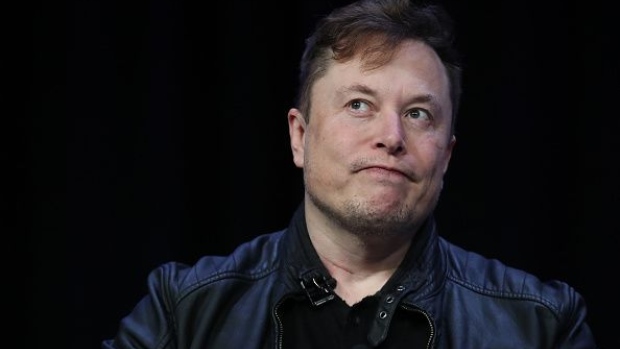Nov 3, 2022
Musk’s $55 Billion Tesla Pay Package Spoiled by Conflicts of Interest, Investor Claims
, Bloomberg News

(Bloomberg) -- The decision by Tesla Inc. directors to authorize a $55 billion pay package for Chief Executive Officer Elon Musk in 2018 was marred with conflicts of interest and improper disclosures about the performance benchmarks he’d be held to, a disgruntled investor argued in a court filing.
Musk, the world’s richest person and Tesla’s largest shareholder, must testify before a Delaware judge at a Nov. 14 trial over the claim by investor Richard Tornetta, who says the billionaire engineered the windfall pay deal by pushing it through a “supine board.” The CEO was awarded stock options that vest over 10 years when certain performance milestones are achieved.
Musk dictated the “framework and financial terms, which remained fundamentally unchanged” throughout the board’s approval process, Tornetta’s lawyers said in a Delaware Chancery Court brief unsealed Wednesday.
Legal experts say the case will spotlight the role of courts in regulating executive compensation, and shine a light on Musk’s peripatetic management of Tesla and other companies he owns. Last month, the entrepreneur closed his $44 billion acquisition of social-media platform Twitter Inc.
The case is being heard in Delaware because Tesla, like Twitter, is incorporated in the state, the corporate home to more than half of US public companies and more than 60% of Fortune 500 firms. Its chancery judges are business law experts who hear cases without a jury, often on a fast-track basis. More than 1.8 million companies are incorporated in the state.
Judge Kathaleen St. J. McCormick -- who oversaw Musk’s legal fight to get out of this Twitter deal until he decided to go through with the transaction -- will review testimony about his Tesla pay package and decide whether it amounted to a waste of corporate assets. She’ll hand down a written decision sometime after the five-day trial concludes.
Defending Pay
In their pre-trial filing, Musk’s lawyers denied Tornetta’s claims the compensation package was excessive. They said he was a unique manager and deserved a bespoke pay plan based on Tesla’s astronomical rise in value over the last decade.
“The plan designed and approved by the board was not a typical pay package intended to compensate the ordinary executive for overseeing the day-to-day operations of a mature company,” his attorneys said in Musk’s pre-trial brief. “That is because Musk is not the typical CEO.”
According to court filings, the compensation plan included an award of more than 100 million Tesla stock options -- to be doled out over 12 periods, but only if the car company hit certain performance goals. The electric-car maker far surpassed those metrics, with Tesla’s market capitalization jumping from $53 billion to more than $690 billion over four years, Musk’s lawyers said.
‘Part-Time Work’
Tornetta’s lawyers rejected Tesla directors claims they’d loaded up Musk with Tesla stock options to ensure he remained at the head of the company and focused on its success. The investor noted Musk already splits management time between Tesla, Space X, his aerospace firm, and his other startups. So, his Tesla pay plan rewards “part-time work,” the filing said.
According to court filings from Tornetta, Musk testified in a deposition that “generally speaking, the allocation of my time to Tesla remains a majority of my time. I would say on the order of two‐ thirds of my time and brain space.”
The board’s compensation committee, headed by Musk’s friend and confidant Ira Ehrenpreis, was so beholden to the billionaire its members couldn’t begin to make an independent assessment of a reasonable compensation plan, Tornetta contends.
The board’s proxy statements about Musk’s pay deal were misleading because directors described themselves as “independent despite their numerous indisputable conflicts,” Tornetta’s lawyers said in the filing.
And the Tesla board’s disclosures to investors about the pay plan’s goals violated Delaware law, according to the brief.
In proxy statements, the board said the pay package included a series of “stretch goals, selected to be very difficult to achieve,” but failed to disclose that three of those milestones likely already had been met as of the date of the shareholder vote on the plan, Tornetta’s lawyers said.
Tornetta filed his derivative suit against Musk and other Tesla directors on behalf of the company in 2018. That means any money recovered will go back to the electric carmaker and not to Tornetta. The investor is asking McCormick to make Musk return stock options awarded under the compensation plan.
The case is Tornetta v. Musk, 2018-0408, Delaware Chancery Court (Wilmington).
(Updates with details of compensation plan, details from filing.)
©2022 Bloomberg L.P.


